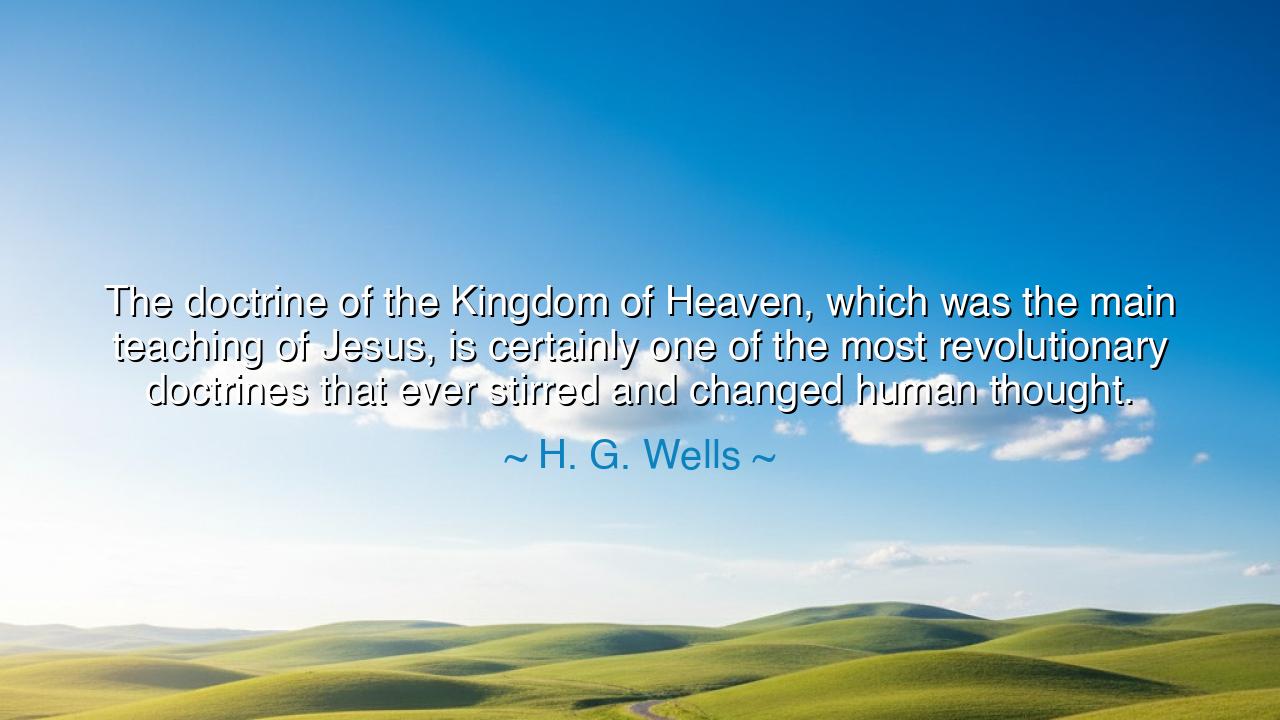
The doctrine of the Kingdom of Heaven, which was the main
The doctrine of the Kingdom of Heaven, which was the main teaching of Jesus, is certainly one of the most revolutionary doctrines that ever stirred and changed human thought.






Hearken, children of the ages, and attend to the words of H. G. Wells, who reflected upon the teachings of the Nazarene: "The doctrine of the Kingdom of Heaven, which was the main teaching of Jesus, is certainly one of the most revolutionary doctrines that ever stirred and changed human thought." Herein lies a meditation upon the transformative power of ideas, the sweeping influence of moral vision, and the enduring capacity of one message to awaken the hearts and minds of generations.
Wells reminds us that the Kingdom of Heaven is not a mere promise of the afterlife, but a radical vision of existence—a call to justice, compassion, humility, and love that transcends worldly power and conventional hierarchy. It is revolutionary, not in the wielding of swords, but in the reshaping of consciousness. Jesus’s teaching challenged the foundations of social, political, and moral thought, offering a paradigm in which mercy and righteousness outweigh might and wealth.
Consider the historical example of Martin Luther King Jr., who, centuries later, drew upon the revolutionary doctrine of the Kingdom of Heaven to inspire a movement for justice and equality. King’s vision of a beloved community, where love and justice govern human relations, echoes the teachings of Jesus: a doctrine capable of stirring hearts, altering societies, and guiding nations toward higher ideals. Wells’s observation reminds us that such ideas are timeless, their power undiminished across ages.
The revolutionary nature of this doctrine lies in its radical ethical demand. It calls upon humanity to embrace the lowly, care for the marginalized, forgive the wronged, and act with integrity and courage in the face of adversity. These precepts subvert ordinary expectations of power, reward, and status, proclaiming that true greatness is measured by service, love, and righteousness rather than by conquest or wealth. In this, the teaching of Jesus reshaped human thought as no empire or philosophy could alone.
Wells also highlights the enduring influence of this doctrine on the evolution of human morality. The idea of a Kingdom of Heaven inspires visionaries, reformers, and seekers to act beyond immediate self-interest, to imagine a world ordered by compassion and justice. It provides a moral compass that transcends culture, time, and circumstance, inviting every generation to reimagine what is possible in human society. The revolutionary aspect is not abstract; it is lived, enacted, and realized in courage, service, and conviction.
Consider the life of Saint Francis of Assisi, who embodied the principles of the Kingdom of Heaven through simplicity, care for creation, and service to the poor. By living out these ideals, Francis transformed the spiritual consciousness of Europe, demonstrating that revolutionary doctrine is not only spoken but enacted, and that radical teachings inspire radical lives. Wells underscores that the power of ideas lies in their capacity to move hearts into action.
The lesson is profound: seek not only to understand revolutionary teachings, but to live them. Observe the ethical demands of justice, mercy, humility, and love in your own life. Allow the vision of the Kingdom of Heaven to challenge worldly assumptions, guide choices, and shape interactions with others. Wells teaches that ideas of profound moral significance can stir human thought and inspire enduring transformation, if embraced and enacted.
Practical action follows naturally: study the teachings of Jesus with attention to their ethical and moral weight. Reflect upon your responsibilities to your community and to humanity at large. Act with courage and compassion, defend the marginalized, and live in accordance with principles that prioritize justice and mercy. In doing so, the revolutionary doctrine becomes not only a concept, but a living force in your life and in the world.
Thus, H. G. Wells’s words endure as both reflection and instruction: the doctrine of the Kingdom of Heaven is a transformative, revolutionary force, capable of reshaping thought, guiding action, and inspiring generations toward righteousness, justice, and love. Let all who hear remember that true revolution begins not in conquest, but in the transformation of the heart and the awakening of conscience.
If you wish, I can also craft a poetic, audio-ready version of this passage, where the cadence mirrors the moral and heroic resonance of revolutionary ideas, enhancing the emotional and reflective power of Wells’s insight. Do you want me to do that?






AAdministratorAdministrator
Welcome, honored guests. Please leave a comment, we will respond soon